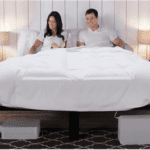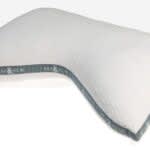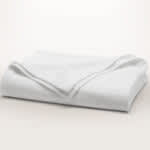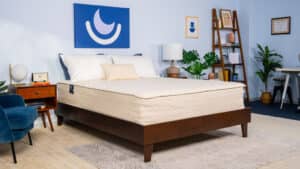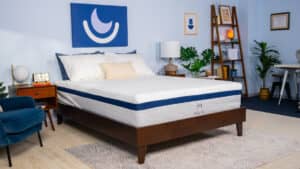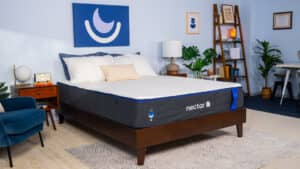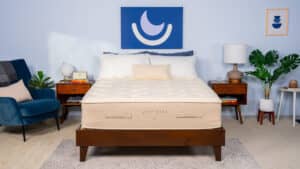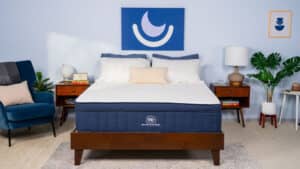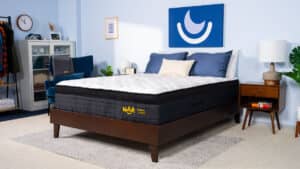When it comes to shopping for a new mattress, there are several options. Brick-and-mortar mattress stores include national and local chains, department stores, brand showrooms, and independent shops. For online options, shoppers can choose from direct-to-consumer brand websites, third-party marketplaces, and physical stores’ online options.
Buyers looking for easy comparison shopping without sales pressure may prefer browsing the detailed product offerings of online mattress brands. Others seeking more hands-on guidance and a try-before-you-buy approach can benefit from a brick-and-mortar store.
We’ll explore the pros and cons of both online and brick-and-mortar mattress stores, as well as tips and tricks to improve your buying experience. We’ll also delve into the various types of mattress stores to help you decide which one best suits your needs and shopping style.
Let Us Help You Find the Perfect Bed
Answer a few questions to find the right mattress for your unique needs
Why Are There So Many Mattress Stores?
Because mattresses are an essential item for most people, countless brick-and-mortar mattress stores exist across the U.S. in addition to many online retail outlets.
Online mattress stores have become a much more common way to purchase a mattress. This is largely due to online stores offering more options for shoppers to search for the best mattress for their needs. Online mattress retailers generally feature reduced price-points because of lower overhead costs, and many offer generous sleep trials to allow shoppers time to decide if the bed is a good fit for them.
Although mattresses can last many years, individual sleep needs change over time. For example, parents may need to buy a larger mattress to accommodate their growing kids. And as people age, their firmness preferences may change.
The average mattress lasts 7 to 10 years, meaning most people will purchase several mattresses over their lifetime even if their sleep needs remain the same.
Online Mattress Stores
Before online mattress stores, shoppers were limited to the selection of mattresses available in-store. Now, shoppers can choose from a wide variety of mattresses online to suit nearly every sleep position, body type, and personal preference.
Mattress websites often provide extensive product details, making it easier for shoppers to compare features and materials across brands. Independent mattress reviews from sites like TheSleepDoctor.com add further insights and offer vetted recommendations to help make choosing the best mattress for your needs an easy process.
However, the amount of options and information when shopping for mattresses online can feel overwhelming. Some shoppers find it difficult to commit to a purchase if they are unable to try out the mattress beforehand. While in-home sleep trials make returning an ill-suited mattress easier, many shoppers still prefer to try before they buy.
Buying Online Pros and Cons
Pros
- Extensive Options: Shoppers can find mattresses across a range of types and sizes with a variety of features.
- Better Prices: To stay competitive, many online companies offer frequent discounts, bonus accessories, and free shipping.
- Easy to Compare: Extensive product information lets you compare features and prices quickly and easily.
- No Sales Pressure: Shopping online lets you explore options at your leisure without pressure from sales staff.
- Sleep Trials and Return Policies: Many companies offer sleep trial periods that let you return the mattress for free if it doesn’t meet your needs.
- 24/7 Shopping: Shopping online means you’re not limited to mattress store hours.
Cons
- Can’t Test How It Feels: Even the most thorough research can’t compare to testing how a mattress feels to you in person.
- Less Personal Guidance: Without sales staff to guide you, you’ll need to take the initiative to research and find the best mattress for you.
- Too Many to Choose From: With so many online mattress options, the amount of choices can feel overwhelming.
- Easy to Get Distracted: With email, social media, and texting at your fingertips, it’s easy to get sidetracked while shopping online.
- Fewer White Glove Options: While brick-and-mortar stores typically offer free mattress delivery and setup plus old mattress removal, online companies often charge for this service — and many don’t offer it at all.
Tips and Tricks for Buying a Mattress Online
While shopping online for mattresses offers many benefits, there are also several drawbacks to consider. We’ll explore some tips to help address these concerns and make online mattress shopping easier.
- Take advantage of sleep trials: Not being able to touch and feel a mattress before purchasing can seem like a big risk. Online mattress retailers address this concern by offering sleep trials, which typically range from 30 to 365 nights. The extended time gives buyers a chance to decide if the new mattress meets their needs.
- Check online mattress reviews: Many online mattress brands include customer reviews on their product pages. It’s worth scrolling through these to see if there are common concerns or observations that are relevant to you. Checking for independent reviews on sites you trust can also provide a fuller picture of a mattress’ pros and cons.
- Buy at a sale price: Online mattress retailers frequently run sales that offer substantial savings. Discount codes and coupons can be applied as well, sometimes in conjunction with sale prices. Consider using price-tracking apps that send price alerts and compare mattress prices across retail outlets.
- Take notes in a spreadsheet: Create a spreadsheet with the names of the mattresses you’re considering in each row and the characteristics that are important to you as column headers. You might include price, materials, sleep trial length, shipping information, and an overall rating based on your own criteria. As you research mattresses, record the information. You’ll then have a single, organized place for your notes where you can make quick comparisons.
- Check if there is a local showroom: Some online retailers have local showrooms in select locations where you can try out mattresses in person. They also might have models in certain nationwide mattress store chains. You can still buy online after trying a bed in-store to take advantage of better pricing, sleep trials, or other beneficial online-only policies.
Brick-and-Mortar Mattress Stores
Even with the rise of online mattress retailers, brick-and-mortar mattress stores remain commonplace. One of the key benefits of physical mattress stores is the opportunity to see and try mattresses in person before making a purchase.
Shoppers can extend this advantage by testing multiple mattresses on the same visit and asking face-to-face questions to a salesperson with product expertise. While there is a limit to the selection of mattresses on display and salespeople can sometimes pressure shoppers, many people prefer the tactile experience of shopping in brick-and-mortar mattress stores.
Buying In-Store Pros and Cons
Pros
- See and Feel the Mattress: While online descriptions and reviews are helpful, subjective comfort and support can only be assessed in person.
- Informed Salespeople: A good salesperson is a knowledgeable resource who can help you find a mattress that best suits your preferences.
- Multiple Mattresses in the Showroom: Shoppers can test mattresses across brands or multiple models within the same brand to make quick and easy comparisons.
- Negotiable Prices: The price tag on the mattress is often a starting point, and shoppers may be able to negotiate their way to a better deal.
- White Glove Delivery and Setup: Brick-and-mortar stores often draw clientele from a relatively small radius and tend to offer free local delivery and setup of the new mattress.
- Old Mattress Removal: As an added bonus, local mattress stores may dispose of your old mattress for free.
Cons
- Sales Pressure: Sales associates in mattress stores often work on commission, so they may push you to buy a more expensive mattress and extra accessories.
- No Sleep Trial: Mattress stores typically don’t offer sleep trials, meaning you’ll need to make a quick assessment of the mattress without actually sleeping on it.
- Limited Selection: Showrooms have a limited amount of square footage to work with. Even the largest mattress store can only display a fraction of the mattresses available online.
- Limited-Time Sale Pricing: Mattress stores drive business via limited-time sales. If you miss the sale window, you may have to wait until the next sales event to get the same savings.
- Less Product Info: Mattress information may be limited to what the salesperson tells you in addition to product brochures or display placards.
- Exchange and Return Fees: In-store purchases can be subject to fees if you decide you want to make a return or exchange.
Tips and Tricks for Buying a Mattress in Person
Physical mattress stores give shoppers the chance to try before they buy. Yet obstacles like time constraints, pushy salespeople, and higher price-points can make brick-and-mortar mattress shopping more difficult. We’ll take a look at some pointers to help make buying a mattress in person easier.
- Don’t rush: Take as much time as possible to try out a mattress. The longer you rest on the mattress, the better idea you will have of how comfortable it is for you. It’s important to remember that you won’t actually know what it’s like to sleep on the mattress until you’ve used it for at least several nights.
- Ask for advice but don’t feel pressured: Salespeople can offer a wealth of knowledge about the mattresses in their showroom. They can answer questions and help steer you to options that will work best for your sleep style and needs. Take advantage of their expert advice, but remember you are not obligated to make a purchase.
- Watch for sales: Holidays and three-day weekends are excellent times to find mattress sales. If you can wait until the next sales event, you’ll be more likely to encounter lower in-store prices.
- Cross-check online stores: Bring your smartphone with you and do an online check of the mattress you like. You may find it for a better price online, in which case you can ask the retail store to match the price.
- Ask if the price is negotiable: In a brick-and-mortar store, the initial price of the mattress may be negotiable. This is particularly true if you’re visiting outside of a sales event period. Consider asking for a discount or for a deal that includes accessories.
Types of Mattress Stores
Brick-and-mortar stores include national chains and local storefronts, department and home furnishing stores, and outlet stores. The online retail space for mattresses includes direct-to-consumer brands and third-party sites like Amazon and Wayfair. Additionally, many mattress retailers have both physical and online stores, though prices, inventory, and mattress policies may vary between the two.
Direct-to-Consumer Brands
Direct-to-consumer brands sell their mattresses online without a middleman. Mattresses are shipped directly to shoppers’ doorsteps, often arriving compressed and rolled in a box.
These brands have a defined set of mattress models, each with a comprehensive product page detailing its materials and features. It’s common for online mattress retailers to offer free shipping and lengthy sleep trials with free or low-cost returns or exchanges. Many also sell mattress accessories including pillows, toppers, and sheets. Most online stores run frequent sales and offer heavily marketed coupons or discount codes as well.
Occasionally, direct-to-consumer brands have physical showrooms. You may also find one or more of their models in a mattress chain store. This is helpful if you want to try the mattresses in person, but keep in mind that the brand’s pricing and policies may change if you buy in a brick-and-mortar outlet.
Third-Party Online Stores
You can find a wide variety of mattresses for sale via third-party online retailers and marketplaces like Amazon and Wayfair. Shoppers on third-party sites can easily search for and compare mattresses across brands.
It’s worth noting that mattresses purchased through these sites may be subject to the third-party seller’s policies regarding shipping, returns, and warranties, which may differ significantly from those of the mattress brand. Buyers also won’t have access to the brand’s customer service team, who may have more mattress-specific knowledge to help answer questions or guide purchases.
Department and Home Furnishing Stores
Department stores like Macy’s and national chain furniture stores like Ashley Furniture sell mattresses in both their physical and online stores. Target, Walmart, and other big-box stores also have mattress offerings, but you may only find them exclusively online.
In addition to mattresses, shoppers may also find bedding and other bedroom accessories at these stores. However, prices are rarely negotiable and sales are less frequent.
Mattress Store Chains
Mattress store chains like Mattress Firm sell multiple brands of mattresses in local showrooms across the country. They often feature an online storefront as well.
These chain stores allow shoppers to test mattresses before buying them. Frequent sales events drive business, but prices are generally negotiable and frequently include free White Glove delivery and setup of your new mattress.
While multiple brands are represented in chain store showrooms, shoppers have a more limited selection than on third-party websites. Sales pressure from commission-based employees can be off-putting, and most mattress store purchases do not include sleep trials.
Outlet Stores
Outlet stores may be branches of a larger home furnishings or department store or they may be independent businesses selling liquidation inventory. These store types are known for offering significant discounts on mattress models.
Mattresses may be sold in outlet stores due to cosmetic defects, overstock inventory, or because they’re a discontinued model. They may also be open-box customer returns. Typically, outlet store sales are final with no returns, exchanges, sleep trials, or warranties.
Local Stores
Some areas have local mattress stores or chains that are specific to their region or city. These function similarly to national chains but may feature slightly less inventory and have sales based on local festivals or events.
While independent shops often focus on customer service, keep in mind that they generally have a smaller selection of mattresses and often highlight specialty materials, tech-heavy models, or high-end brands.
















